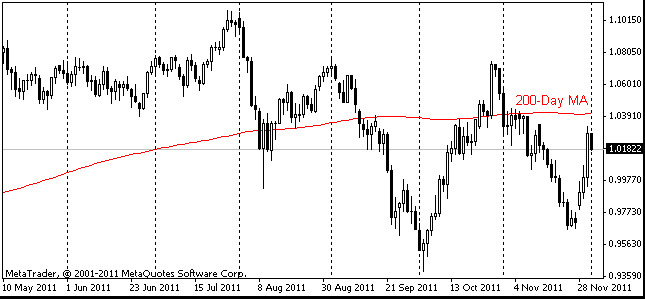EUR/usd
Yesterday the US market remained in the mode of slight correction, which actually failed to produce any significant impact on the EUR/USD rate. At some point the single currency rose to the two-week high of 1.3280, but didn't manage to consolidate at this level. Apparently, the markets needed a larger batch of news to decide on the further action. The only interesting statistics came in on the existing home sales. According to the data published by the National Association of Realtors, home sales fell by 0.9% in February to the annual pace of 4.59 million. However, last month sales jumped by 5.7%, so there's no cause for concern about the stability of recovery in this sector. As was mentioned yesterday, the Americans tend to purchase more homes when their prices go up. This report has shown the reverse side. The decline occurred on the rise in the average sale price from $154.6K to $156.6K. When compared with the minimum levels at the height of recession, the market volume have grown by 40%. Besides, as you remember, the new home sales have increased by about 50%. Thus, finally we get the picture of quite a healthy growth. Today's data on the European flash PMI for March have come in surprisingly weak. The composite index has fallen to 47.7 against the expected 49.6 and 49.0 a month earlier. The services sector doesn't feel better. Instead of going up to 49.3 the composite indicator has fallen to 48.7 from 48.8 a month earlier. This index is a creditable indicator, so its weak figures have served as a strong impetus for selling, nipping in the bud all attempts of the bulls to fight for the 1.33 point.

GBP/USD
The British government made every effort to smooth out the release of the new budget. And we should say, they have succeeded. As has been generally expected, the 50% income tax for the wealthy will be replaced by the 45% one starting next year. Many of the common British people will be unhappy with the abolition of tax benefits for the elderly. But this step makes up for the easing in business. From what we know, low business taxes are more favourable for the country's business activity growth and ultimately entail the increase in public revenues. However, at this point Britain risks following the path of Ireland, whose housing market, banking sector and economy as a whole have proved greatly overheated after sticking to this strategy for a dozen of years. We hope that the British will be able to keep this delicate balance. However, what goes without doubt is the tendency to focus on the increasing attractiveness of doing business in the country.

gold
Gold continues to trade in a narrow corridor around the 1650 USD per ounce, which is below the long-term support line. In fact, at the end of December gold already fell below this level, but then again jumped up. It is most likely that in the coming weeks the metal will keep declining on the rising interest in the high-yield assets. The yield of the U.S., British and German debt markets seems to have turned in the positive direction. Meanwhile, investors' money has started to show up in smaller markets. The previous high interest in gold can be attributed to the fact that safe bonds were not very profitable. The situation may change in the near future, thus depriving gold of some support.

AUD/USD
The aussie has been one of the most unfortunate currencies these days. The growing concerns about the slowdown in China have been causing the decline in the Aussie for three days in a row. The decline turned out to be even stronger than expected, as the pair fell below 1.04 and at night reached the 1.0375 level. Among the most interesting events on the agenda is the agreement between the RBA and the People's Bank of China on the Au$ 30 bln /RMB200 bln swap in the national currencies. This is not the first time China enters into such a deal, but it is noteworthy that earlier it did this with developing countries. As pointed out in the statement, the main goal is to increase the bilateral direct investment.
